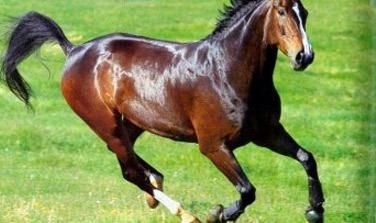Образовательная программа
Horse breeding, Innovative Technology in horse breeding

Studying the subjects of this educational program will allow acquire the knowledge to improve the competitiveness of livestock products and raw materials, research methods in animal husbandry, modern methods of breeding, horse breeding and equestrian sports tourism, feeding horses. This trajectory should be selected by undergraduates specializing in horse breeding industry, working with horses of sports productive kind. When writing a master's thesis disciplines of the program will be invaluable assistance to undergraduates involved in horse breeding
After studying the subjects of the educational program " Horse breeding, innovative technologies in horse breeding" undergraduates must:
Know and understand:
- classification of the feed, the essence of a comprehensive assessment of their nutritional value, using normalized feeding of individual species, groups of animals develop rations;
- zootechnical requirements to feed, air environment, to running animal husbandry;
- methods of artificial insemination of horses;
- the organization, planning, management of the system of agricultural production;
- ways of increasing productivity by animal species;
- technology of animal products and raw materials;
- processing technology of mare's milk and kumys;
- equipment for processing of livestock products;
- exterior and interior features, determining the age;
- basic principles of plant breeding and biotechnology of farm animals;
Be able to:
- provide accounting of livestock products in small, medium and large farms;
- manage the production of high quality products at cost reduction; provide feeding, keeping and breeding animals in the conditions of intensive and advanced technologies;
- select progressive and efficient technologies of production and processing livestock products;
- use rationally natural resources and organize measures on the environment protection.
- develop and organize the implementation of the plan of breeding;
- evaluate the quality of feed;
- bonitirovat animals;
Possess:
- microkopying technique;
- production technology, processing of milk and meat;
- technology of primary processing of raw materials and animal products, determining their quality;
- progressive and cost-effective technologies of production and processing of livestock products;
- Training horses for tests;
- recipes of feed and premixes, feed mixtures used in feeding horses.
Catalog of disciplines of the educational program
Catalog of disciplines of the educational program contains a description of each discipline separately indicating the prerequisites and postrequisites, the number of credits, types of classes, and information about the leaders of the program.
Profile disciplines
Modern methods of breeding – 3 credits
Prerequisites:.Zoology, animal morphology, physiology, animal genetics with biometrics, breeding and agricultural biotechnology animals by species
Course Outline: The state of the industry. Modern computerized accounting programs in animal husbandry. SELEX. Large-scale breeding. Testing and evaluation of sires on the quality of offspring. Embryo. The use of new best practices. The introduction of innovative technologies in livestock production.
Types of classes: practical, laboratory classes
Program manager: Brel I.M.
Improving the competitiveness of livestock products and raw materials – 3 credits
Prerequisites: Breeding and selection of agricultural animal morphology, physiology, agricultural animals, animal nutrition, zoohygiene, cattle breeding, horse breeding, poultry farming.
Course Outline: Technology of milk and milk products. Milk, as polydisperse system. Biochemical changes in milk processing. Technology of production of drinking milk and dairy products, butter, cheese and etc. Determining carcass quality.
Types of classes: practical, laboratory classes
Program manager: Shaikamal G.I..
Methods of scientific research in animal industries – 3 credits
Prerequisites: methodology of experimental work, genetics with biometrics
Course Outline: Use of statistical techniques in animal modeling, biometrics and disciplines of general and particular animal science. Types of zoo-technical experiment. Methods of collecting and analyzing data during a scientific experiment. Organization and basic teaching methods of making husbandry experiments. Methods of conducting scientific experiments. Mathematical analysis of experimental data. Economic evaluation and presentation of the results of the research. Preparation and formulation of a thesis.
Types of classes: practical, laboratory classes
Program manager: Brel I.M.
Sport horse breeding and horse riding –3 credits
Prerequisites: animal morphology, animal physiology, farm animal feeding, breeding and selection of farm animals, zoohygiene with the basics of designing livestock facilities.
Course Outline: State of the industry. Breeding horses. Types of races. Rates of feeding horses. Training young. Prepare horses for testing. Hippodrome test. The index of success. National kinds of horse sports. Valuation of breeding horses. and feeding horses.
Types of classes: practical, laboratory classes
Program manager: Muslimov B.M.
Feeding horses – 3 credits
Prerequisites: Horse breeding, production technology of horsemeat and kumys
Course Outline: Modern feeding systems in horse breeding. Techniques of normalized feeding. Full feeding and its role in the prevention of metabolic disorders, reproductive functions, the number and quality of the products obtained in horse breeding. Method of composition and analysis of individual diets and feeding systems in different directions in horse breeding. Recipes of feeds and premixes, feed mixtures used in feeding horses. Methods of zootechnical, veterinary and economic control over a varied diet. The study of environmental cleanliness of feed and fermented mare's milk.
Types of classes: practical, laboratory classes
Program managers: Muslimov B.M., Brel-Kesileva I.M.

